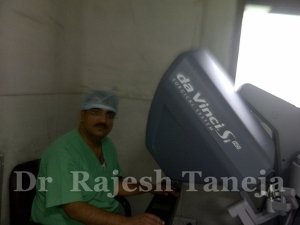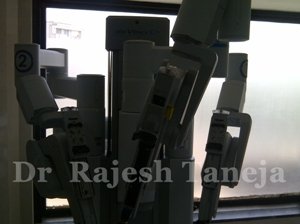Cancer of Prostate Gland and Robotic Surgery
Cancer of prostate is the most common cancer in men. Almost 80%of men over 80 years of age may have cancerous tissue in their prostate glands. If the diagnosis is made early, when the disease is still confined to the prostate gland, then robotic surgery could be curative for a patient. However, due to lack of awareness, a large majority of men who are diagnosed as cancers of prostate are actually in late stages when the disease has already spread to other organs like bones, lymph nodes or other parts of the body. The prostate cancer can be picked up by getting a simple blood test “PSA or Prostate Specific Antigen”. This can be done in men above 50 years of age with.
The stages of prostate cancer could be grouped for practical purposes as follows
Organ confined or Localised cancer of Prostate:
If the cancer is contained within the boundaries (Capsule) of prostate gland, then removal of organ can offer cure of the disease. But this stage may be confirmed by bone scan, MRI of pelvis and other tests as and when required. If a patient is not fit for surgery, then he may be treated by local Radiotherapy, which is expected to kill most of the cancer cells within the prostate gland. Some suitable patients may be benefitted by HIFU or Focussed Ultrasound energy that is used to destroy the cancer cells. The aim in this stage should be cure of disease, which might be possible to achieve in quite a few percentage of this group. The major disadvantage of Robotic surgery in these men is that almost all patients would have incontinence of urine (loss of control of urine) requiring adult diapers for variable period of time from few weeks to few months. A small proportion of these men may never be able to have a proper control of urination for whole of their lives. Another major drawback is the loss of sexual power after robotic surgery. Although theoretically, nerve sparing procedures can be done, but for all practical purpose, a patient undergoing robotic surgery for cancer of prostate should be mentally prepared to lose his sexual function after the operation. The other problems with robotic surgery might be formation of stricture in the urinary passage, urethra, necessitating some cystoscopic procedure to keep the passage open.
Advanced Cancer of Prostate:
This means that the cancer has come out of the prostate gland into neighbouring structures but distant sites like bones are not involved. In this situation, the aim is to contain the disease and improve quality of life and attempt to prolong the life of patient. This can be done by Hormone manipulation and local radiotherapy. There is no role of Robotic surgery in this situation.
Cancer of Prostate:
In this situation, the cancer has spread to distant sites like backbone, hip bone or other parts of the skeletal system. In this situation the primary treatment is Hormone manipulation. Prostate Cancer cells are dependent on Testosterone hormone, which is produced by testes in males. Some amount of testosterone hormone is also produced in adrenal glands. If the testes are removed, the supply of testosterone hormone to the cancer cells is cut off leading to the death of these cells and thus the symptoms due to disease may be reduced. One other method of stopping the production of testosterone is by giving certain injections periodically. These injections act on pituitary gland and signal the testes to stop producing testosterone. Another group of drugs, known as Anti androgens, can be given in the form of tablets to block the effects of stray androgen hormones on the cancer cells. However in due course of time, the cancer cells may start behaving abnormally and thrive without testosterone in blood. This is called Hormone escaped disease or Castrate resistant prostate cancer. Radiotherapy may be used for painful bone secondary (metastasis) lesions.


